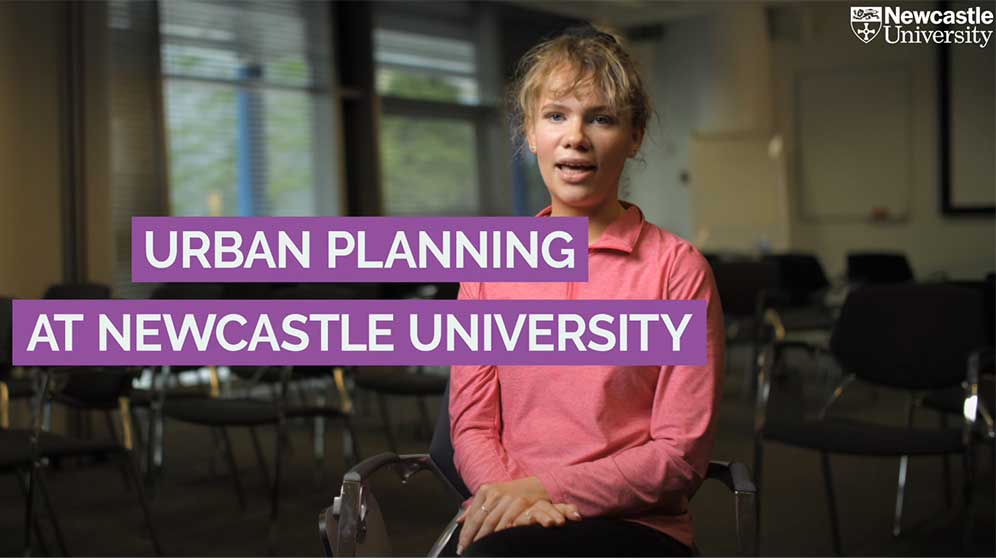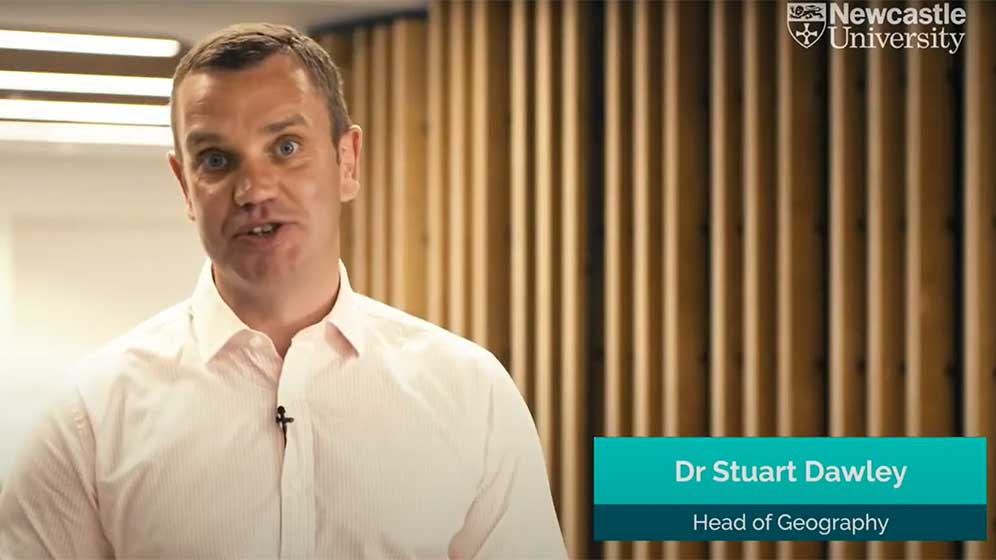Geography and Urban Planning BA Honours
- UCAS code: LK74
- Full time
- 3 years
Study Human Geography alongside issues relating to Urban Planning to understand the challenges of our cities and contribute to future societies.
You are currently viewing course information for entry year: 2026
Next start date:
- September 2026
UCAS Institution name and code:
- NEWC / N21
Course overview
You'll learn about the social forces that shape our society and the spaces we live in and discover techniques for ‘reading’ cities and spaces.
Our renowned experts will guide you through the practices of public planning and design, and help you explore the political and democratic factors that influence it, setting foundations for your career.
The degree integrates core areas from our geography and urban planning degrees to equip you with strong analytical and practical skills.
Your first year is professionally accredited by the Royal Town Planning Institute.
Your course and study experience - disclaimers and terms and conditions
Please rest assured we make all reasonable efforts to provide you with the programmes, services and facilities described. However, it may be necessary to make changes due to significant disruption, for example in response to Covid-19.
View our Academic experience page, which gives information about your Newcastle University study experience for the academic year 2025-26.
See our terms and conditions and student complaints information, which gives details of circumstances that may lead to changes to programmes, modules or University services.
Quality and ranking
Professional accreditation and recognition
All professional accreditations are reviewed regularly by their professional body.
Modules and learning
Modules
The information below is intended to provide an example of what you will study.
Most degrees are divided into stages. Each stage lasts for one academic year, and you'll complete modules totalling 120 credits by the end of each stage.
Our teaching is informed by research. Course content may change periodically to reflect developments in the discipline, the requirements of external bodies and partners, and student feedback.
Optional module availability
Student demand for optional modules may affect availability.
Full details of the modules on offer will be published through the Programme Regulations and Specifications ahead of each academic year. This usually happens in May.
To find out more please see our terms and conditions
We’ll introduce you to the study of planning and geography through subjects such as planning theory and systems, and urban, regional, social and environmental issues.
Modules
| Compulsory Modules | Credits |
|---|---|
| Interconnected World | 20 |
| Coasts and Communities: Human Geography Fieldwork | 20 |
| Mapping a changing world: GIS for Geographers | 20 |
| Planning Processes | 10 |
| Economics of Development I | 10 |
| Shaping Towns and Cities | 20 |
| Planning for a Better World | 20 |
You can specialise by choosing a range of topics from the geography and planning disciplines. You'll also undertake research training and will have the opportunity to develop employment skills.
Modules
| Compulsory Modules | Credits |
|---|---|
| Research Skills | 20 |
You can continue to specialise by choosing in-depth modules on geography and planning topics, and you'll complete a dissertation on a topic of interest to you. You will also have a further opportunity to develop your employability skills.
Modules
| Compulsory Modules | Credits |
|---|---|
| Dissertation | 40 |
We base these figures and graphs on the most up-to-date information available to us. They are based on the modules chosen by our students in 2024-25.
Teaching time is made up of:
- scheduled learning and teaching activities. These are timetabled activities with a member of staff present.
- structured guided learning. These are activities developed by staff to support engagement with module learning. Students or groups of students undertake these activities without direct staff participation or supervision
Teaching and assessment
Teaching methods
Our courses have a high level of staff and student interaction, including:
- tutorials
- lectures
- seminars
All modules also require a considerable amount of independent study, culminating in a dissertation under expert supervision in stage 3.
Assessment methods
You'll be assessed through a combination of:
-
Coursework
-
Essays
-
Examinations – practical or online
-
Presentations
-
Reports
Skills and experience
Practical skills
You'll study a broad range of theoretical and practical skills, including building design, mapping science, global social and economic change, and local environmental initiatives.
In Stage 2 an optional international study visit provides first-hand experience of other geographical and planning contexts.
Business skills
You'll gain a wide range of skills that will enable you to work in urban or rural policy fields, in public or private practice and with a wide range of other professions.
Opportunities
Work placement
Get career ready with a work placement and leave as a confident professional in your field. You can apply to spend 9 to 12 months working in any organisation in the world, and receive University support from our dedicated team to secure your dream placement. Work placements take place between stages 2 and 3.
You'll gain first-hand experience of working in the sector, putting your learning into practice and developing your professional expertise.
If you choose to take a work placement, it will extend your degree by a year, and your degree title will show you have achieved the placement year. Placements are subject to availability.
Find out more about work placements
Study abroad
Experience life in another country by choosing to study abroad as part of your degree. You’ll be encouraged to embrace fun and challenging experiences, make connections with new communities and graduate as a globally aware professional, ready for your future.
In Stage 2 you can choose to spend a whole semester studying in Europe as part of a study abroad exchange.
Facilities and environment
Facilities
You'll be part of the School of Architecture, Planning and Landscape and will also spend time in the School of Geography, Politics and Sociology.
You’ll be based in the Henry Daysh Building and have access to a dedicated planning studio with computing facilities and social space.

Support
You'll have the support of an academic member of staff as a personal tutor throughout your degree to help with academic and personal issues.
Peer mentors will help you in your first year. They are fellow students who can help you settle in and answer any questions you have when starting university.
We also have a dedicated Learning and Teaching Co-ordinator (Student Support), who can offer you support if you are experiencing issues that may be affecting your performance at University. They can also offer advice about other University services that may benefit you depending on your circumstances.
Your future
Join our network of confident and successful graduates who have gone on to work as planners or surveyors. Take advantage of our departmental links with organisations such as:
- Transport for London
- ARUP
- The Association of European Schools of Planning
Other graduates use this degree as a springboard to other careers in:
- teaching
- law
- business management
- accountancy
- the armed forces and many others
Graduates in demand
You will leave with sought after skills, including teamwork, project management, research and presentation skills, and therefore will have access to a wide variety of careers.
A Geography and Urban Planning degree from Newcastle will ensure you develop the skills that employers look for and can open the doors to a wide range of careers.
Make a difference
Sorry, you need JavaScript to view this video
Careers support
We are committed to developing your employability and have a dedicated careers adviser to offer advice and guidance throughout your degree.
If you choose to change your degree to the Masters of Planning (MPlan) degree during your studies, we will help you to secure placement opportunities in a range of planning environments to which you can apply. This experience is a crucial element of reflective study used to inform Stage 4.
Our Careers Service is one of the largest and best in the country, and we have strong links with employers. We provide an extensive range of opportunities to all students through our ncl+ initiative.
Visit our Careers Service website
Recognition of professional qualifications outside of the UK
If you’re studying an accredited degree and thinking about working in Europe after you graduate, the best place to find current information is the UK Government’s guidance on recognition of UK professional qualifications in EU member states. This official resource explains whether your profession is regulated in another country, what steps you need to take, and which organisation you should contact.
Entry requirements
All candidates are considered on an individual basis and we accept a broad range of qualifications.
The entrance requirements and offers below apply to 2026 entry.
| A-Level | |
|---|---|
| International Baccalaureate | |
|---|---|
Other UK and the Republic of Ireland qualifications
Alternative offers at Newcastle
Through one of our contextual or alternative offer routes, you could receive an offer of up to three grades lower than the typical requirements.
Contextual offers
We use certain contextual data from your UCAS form, alongside your application, to consider challenges that you may have faced in your education and the potential effect this may have had on your qualifications. This means you may be eligible to receive a lower contextual offer.
PARTNERS offers
One of the largest and longest support entry routes to university of its kind for students from underrepresented backgrounds. We support applicants from application through to study.
Realising Opportunities offers
A unique programme delivered in collaboration with 10 leading, research-intensive universities in the UK. The programme is open to students in Year 12/first year of college.
Pathways to Newcastle offers
Pathways to Newcastle, our national skills entry route, is available for specific subject areas.
High Performance Athletes
We support promising athletes at the application stage, who compete in regional, national or international levels in their sport.
Qualifications from outside the UK
English Language requirements
Entrance courses (INTO)
International Pathway courses are specialist programmes designed for international students who want to study in the UK. We provide a range of study options for international students in partnership with INTO.
These courses are specifically designed for international students who want to study in the UK and progress onto one of our undergraduate degrees. Our International Study Centre, has a range of study options including:
- International Foundation
- International Year One
- English Language courses
Find out more about International Pathway courses
Admissions policy
This policy applies to all undergraduate and postgraduate admissions at Newcastle University. It is intended to provide information about our admissions policies and procedures to applicants and potential applicants, to their advisors and family members, and to staff of the University.
University Admissions Policy and related policies and procedures
Credit transfer and Recognition of Prior Learning
Recognition of Prior Learning (RPL) can allow you to convert existing relevant university-level knowledge, skills and experience into credits towards a qualification. Find out more about the RPL policy which may apply to this course.
Tuition fees and scholarships
Tuition fees for academic year 2026-2027
The 2026 entry home fees have not yet been confirmed.
| Qualification: BA Honours | |
|---|---|
|
Home students full time 3 years |
Tuition fees (Year 1)
Not set |
|
International students full time 3 years |
Tuition fees (Year 1)
26,750 |
Year abroad and additional costs
For programmes where you can spend a year on a work placement or studying abroad, you will receive a significant fee reduction for that year.
Some of our degrees involve additional costs which are not covered by your tuition fees.
Scholarships
Find out more about:
Open days and events
You'll have a number of opportunities to meet us throughout the year at our on-campus and virtual open days.
You'll be able to:
- explore our beautiful campus
- find out about our vibrant city
- discover what students think about studying at Newcastle
You'll also have the opportunity to speak to academic staff and find out more about the subjects you're interested in.
Find out about how you can visit Newcastle in person and virtually.
We regularly travel overseas to meet with students interested in studying at Newcastle University. Visit our events calendar to find out when we're visiting your region.
How to apply
Apply through UCAS
To apply for undergraduate study at Newcastle University, you must use the online application system managed by the Universities and Colleges Admissions Service (UCAS). All UK schools and colleges, and a small number of EU and international establishments, are registered with UCAS. You will need:
- the UCAS name and institution codes for Newcastle University (NEWC/N21)
- the UCAS code for the course you want to apply for
- the UCAS 'buzzword' for your school or college
If you are applying independently, or are applying from a school or college which is not registered to manage applications, you will still use the Apply system. You will not need a buzzword.
Apply through UCASApply through an agent
International students often apply to us through an agent. Have a look at our recommended agents and get in touch with them.
Get in touch
By phone
Call us on +44 (0) 191 208 3333 and press option 1. Our opening hours are Monday to Friday 10am until 4pm.
Live chat
Our NCL chatbot might be able to give you an answer straight away. If not, it’ll direct you to someone who can help.
You'll find our NCL chatbot in the bottom right of this page.
Online
Keep updated
We regularly send email updates and extra information about the University.
Receive regular updates by email







